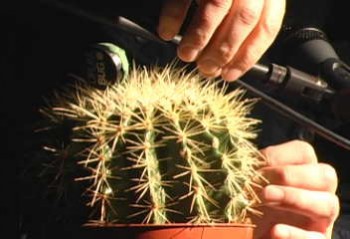Of John Cage and An Amplified Cactus

Details
Most people might avoid the spines of a cactus, but for composer Christopher Shultis, they're nontraditional tone generators: Just clip a contact microphone onto a barrel cactus and pluck. Shultis did that and more in a performance at Cantor Fitzgerald Gallery that complements the haunting prints of Hee Sook Kim, Haverford professor of fine arts, which are currently on display.
Inspired by the life and work of John Cage, Shultis' appearance began with a performance of an early piece of his, "64 Statements re and not re Child of Tree" which includes texts spoken out of the four corners of the room from the cassette players as he plasy in four stations: pod rattles, bamboo wind chimes, branches (likely from the nature trail), and maracas. He then played amplified cactus while reciting an excerpt from James Joyce's Finnegans Wake called "The Wonderful Widow of Eighteen Springs" (which is also a 1961 John Cage piece for voice and piano).
Shultis then spoke about the relationship between "Encounter" and its companion piece "Openings" for winds and percussion, of which he'll play a recording of the first movement and concluded with a discussion of the poetry and sounds used in the installation, including photos of the place where the poems were written--the Manzano mountain wilderness in New Mexico. He is a writer, composer and scholar and currently Regents Professor of Music at the University of New Mexico where he has taught since 1980. He received his Bachelor of Music degree from Michigan State University, his Master of Music degree from the University of Illinois and his Ph.D. in American Studies from the University of New Mexico. His book, Silencing the Sounded Self: John Cage and the American Experimental Tradition was published by Northeastern University Press in 1998. His scholarly writings have been published in many leading journals including The Musical Quarterly, Neue Zeitschrift für Musik, and Perspectives of New Music, for which he serves as an Associate Editor. In 1997 an article published by the Journal of Musicology won an ASCAP Deems Taylor award. Recipient of two Fulbright awards, he taught at the Technische Hochschule Aachen from 1993-94 and the Universität Heidelberg from 1999-2000. He is currently working on a book-length comparison of musical experimentalism in the United States and continental Europe titled "The Dialectics of Experimentalism."
His music has been performed throughout the United States, Europe, Latin America and Asia and featured at conferences and festivals like the Society of Composers Incorporated national convention, the Percussive Arts Society international convention and the Deutsch-Amerikanisches Institut's (Heidelberg, Germany) Seventh Annual Festival of Experimental Music and Literature. He was also a featured artist on KNME's award-winning Colores program. Recorded performances of his compositions are available exclusively through ZERX records. Shultis's activities as a scholar and creative artist continually draw upon his previous work as a solo percussionist and conductor of the highly acclaimed UNM Percussion Ensemble. As Director of Percussion Studies at UNM from 1980-1996, Shultis worked closely with many composers including, among others, Ernst Krenek, Lou Harrison, Michael Colgrass and John Cage. His performance of Konrad Boehmer's Schreeuw Van Deze Aarde for solo percussion (BV Haast, 1990) won an Edison award for best new music recording and various ensemble performances under his direction can be found on the Neuma, Wergo and 3D labels.



